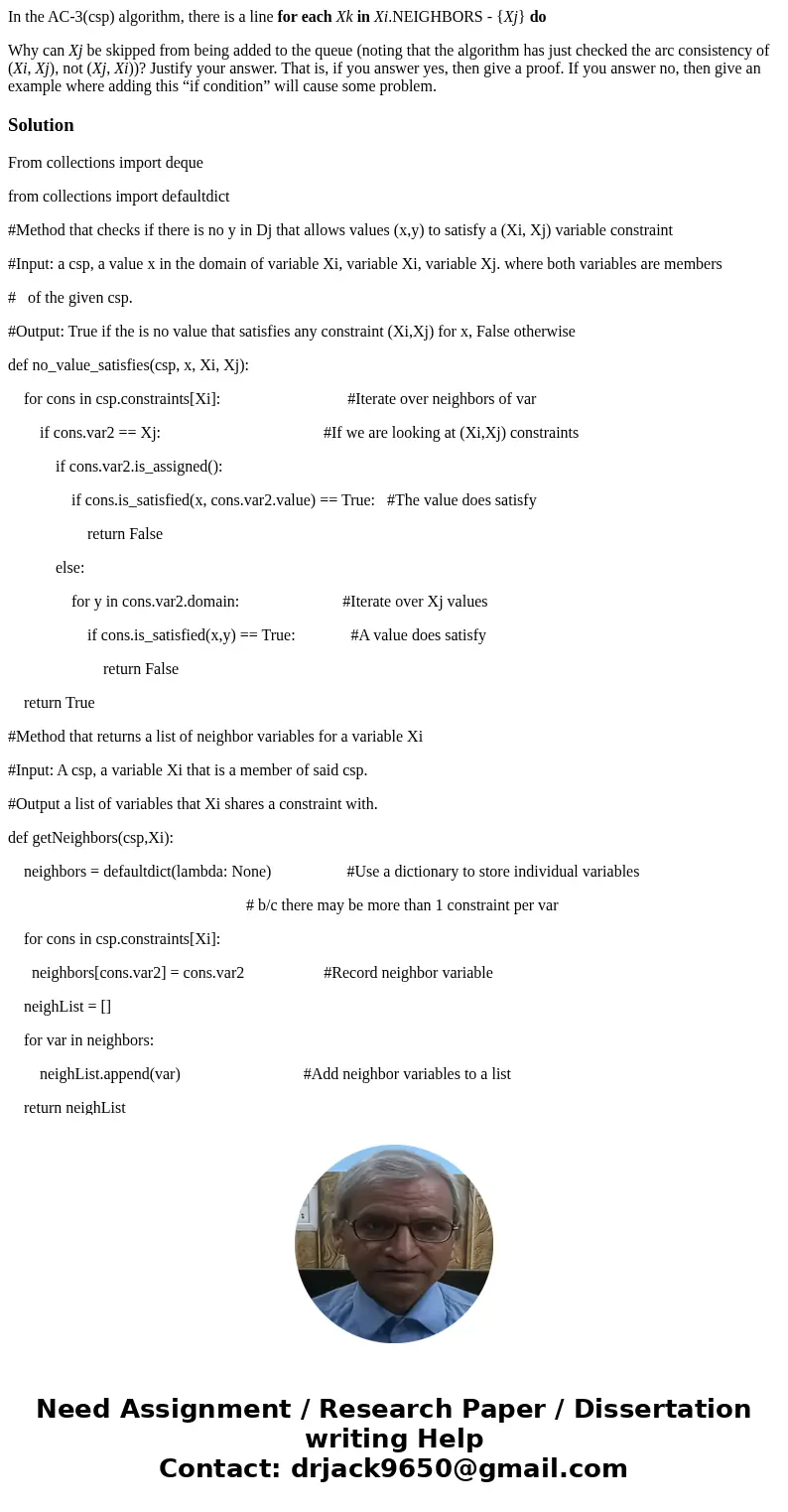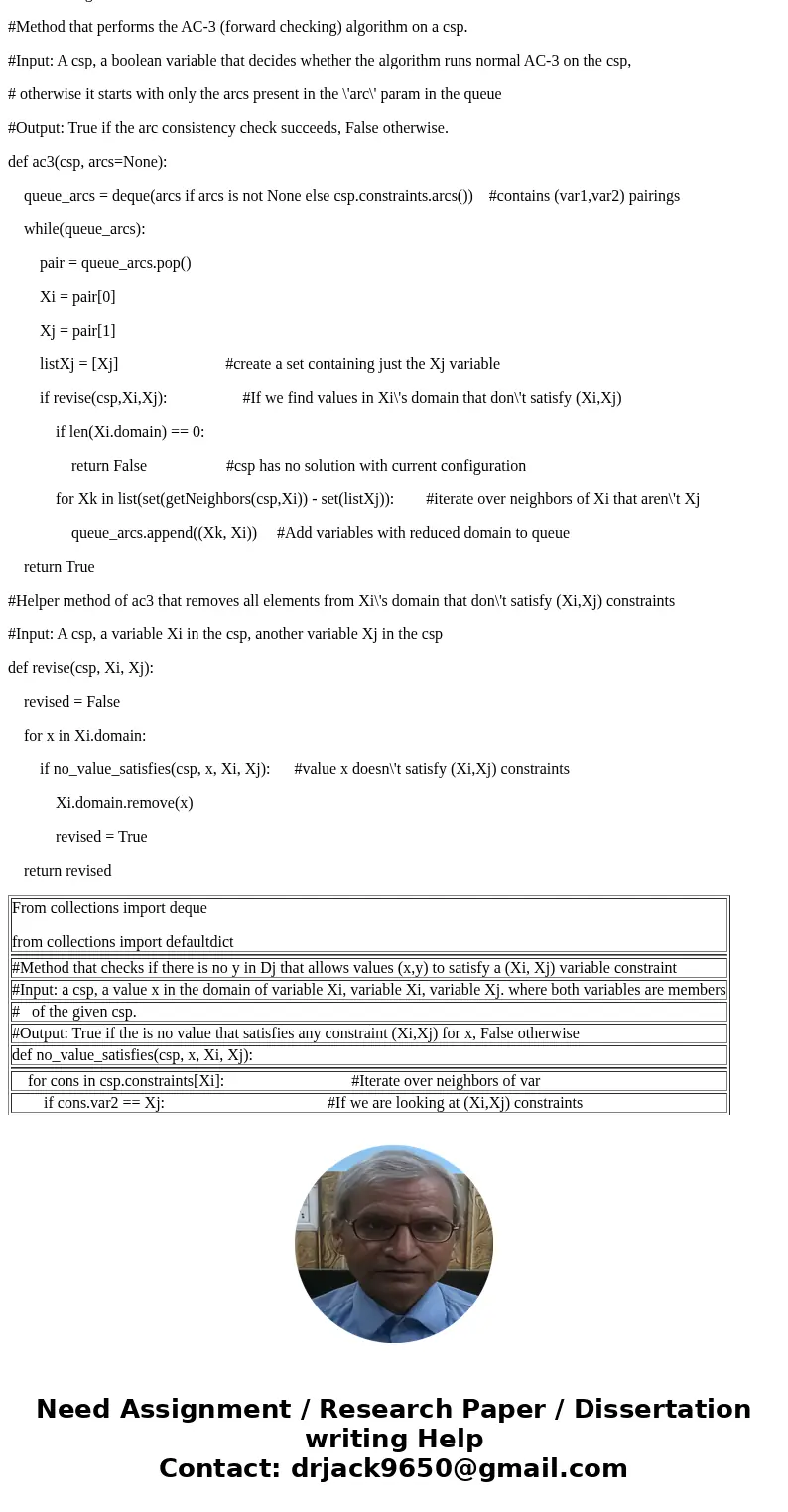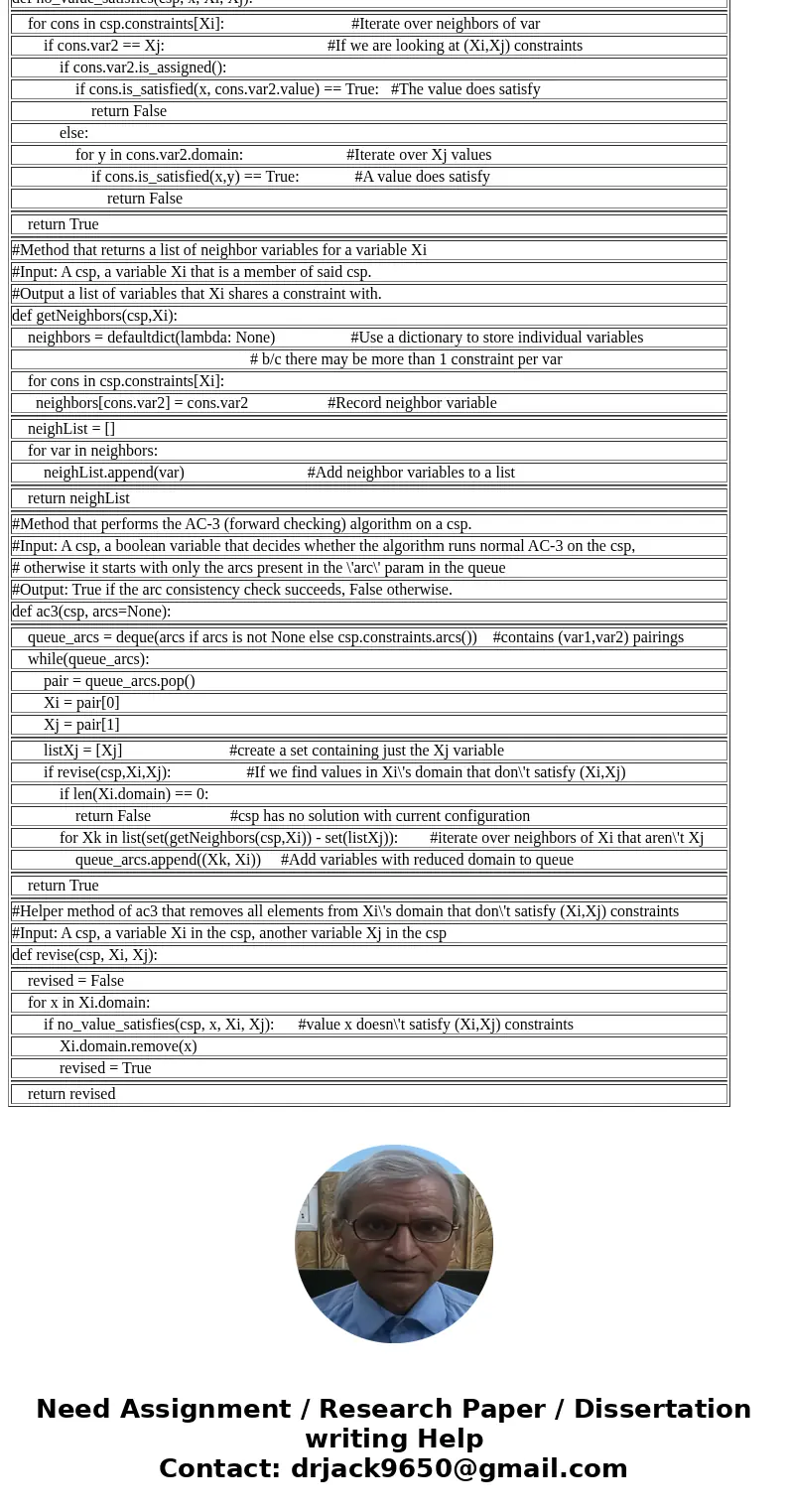In the AC3csp algorithm there is a line for each Xk in XiNEI
In the AC-3(csp) algorithm, there is a line for each Xk in Xi.NEIGHBORS - {Xj} do
Why can Xj be skipped from being added to the queue (noting that the algorithm has just checked the arc consistency of (Xi, Xj), not (Xj, Xi))? Justify your answer. That is, if you answer yes, then give a proof. If you answer no, then give an example where adding this “if condition” will cause some problem.
Solution
From collections import deque
from collections import defaultdict
#Method that checks if there is no y in Dj that allows values (x,y) to satisfy a (Xi, Xj) variable constraint
#Input: a csp, a value x in the domain of variable Xi, variable Xi, variable Xj. where both variables are members
# of the given csp.
#Output: True if the is no value that satisfies any constraint (Xi,Xj) for x, False otherwise
def no_value_satisfies(csp, x, Xi, Xj):
for cons in csp.constraints[Xi]: #Iterate over neighbors of var
if cons.var2 == Xj: #If we are looking at (Xi,Xj) constraints
if cons.var2.is_assigned():
if cons.is_satisfied(x, cons.var2.value) == True: #The value does satisfy
return False
else:
for y in cons.var2.domain: #Iterate over Xj values
if cons.is_satisfied(x,y) == True: #A value does satisfy
return False
return True
#Method that returns a list of neighbor variables for a variable Xi
#Input: A csp, a variable Xi that is a member of said csp.
#Output a list of variables that Xi shares a constraint with.
def getNeighbors(csp,Xi):
neighbors = defaultdict(lambda: None) #Use a dictionary to store individual variables
# b/c there may be more than 1 constraint per var
for cons in csp.constraints[Xi]:
neighbors[cons.var2] = cons.var2 #Record neighbor variable
neighList = []
for var in neighbors:
neighList.append(var) #Add neighbor variables to a list
return neighList
#Method that performs the AC-3 (forward checking) algorithm on a csp.
#Input: A csp, a boolean variable that decides whether the algorithm runs normal AC-3 on the csp,
# otherwise it starts with only the arcs present in the \'arc\' param in the queue
#Output: True if the arc consistency check succeeds, False otherwise.
def ac3(csp, arcs=None):
queue_arcs = deque(arcs if arcs is not None else csp.constraints.arcs()) #contains (var1,var2) pairings
while(queue_arcs):
pair = queue_arcs.pop()
Xi = pair[0]
Xj = pair[1]
listXj = [Xj] #create a set containing just the Xj variable
if revise(csp,Xi,Xj): #If we find values in Xi\'s domain that don\'t satisfy (Xi,Xj)
if len(Xi.domain) == 0:
return False #csp has no solution with current configuration
for Xk in list(set(getNeighbors(csp,Xi)) - set(listXj)): #iterate over neighbors of Xi that aren\'t Xj
queue_arcs.append((Xk, Xi)) #Add variables with reduced domain to queue
return True
#Helper method of ac3 that removes all elements from Xi\'s domain that don\'t satisfy (Xi,Xj) constraints
#Input: A csp, a variable Xi in the csp, another variable Xj in the csp
def revise(csp, Xi, Xj):
revised = False
for x in Xi.domain:
if no_value_satisfies(csp, x, Xi, Xj): #value x doesn\'t satisfy (Xi,Xj) constraints
Xi.domain.remove(x)
revised = True
return revised
| From collections import deque from collections import defaultdict |
| #Method that checks if there is no y in Dj that allows values (x,y) to satisfy a (Xi, Xj) variable constraint |
| #Input: a csp, a value x in the domain of variable Xi, variable Xi, variable Xj. where both variables are members |
| # of the given csp. |
| #Output: True if the is no value that satisfies any constraint (Xi,Xj) for x, False otherwise |
| def no_value_satisfies(csp, x, Xi, Xj): |
| for cons in csp.constraints[Xi]: #Iterate over neighbors of var |
| if cons.var2 == Xj: #If we are looking at (Xi,Xj) constraints |
| if cons.var2.is_assigned(): |
| if cons.is_satisfied(x, cons.var2.value) == True: #The value does satisfy |
| return False |
| else: |
| for y in cons.var2.domain: #Iterate over Xj values |
| if cons.is_satisfied(x,y) == True: #A value does satisfy |
| return False |
| return True |
| #Method that returns a list of neighbor variables for a variable Xi |
| #Input: A csp, a variable Xi that is a member of said csp. |
| #Output a list of variables that Xi shares a constraint with. |
| def getNeighbors(csp,Xi): |
| neighbors = defaultdict(lambda: None) #Use a dictionary to store individual variables |
| # b/c there may be more than 1 constraint per var |
| for cons in csp.constraints[Xi]: |
| neighbors[cons.var2] = cons.var2 #Record neighbor variable |
| neighList = [] |
| for var in neighbors: |
| neighList.append(var) #Add neighbor variables to a list |
| return neighList |
| #Method that performs the AC-3 (forward checking) algorithm on a csp. |
| #Input: A csp, a boolean variable that decides whether the algorithm runs normal AC-3 on the csp, |
| # otherwise it starts with only the arcs present in the \'arc\' param in the queue |
| #Output: True if the arc consistency check succeeds, False otherwise. |
| def ac3(csp, arcs=None): |
| queue_arcs = deque(arcs if arcs is not None else csp.constraints.arcs()) #contains (var1,var2) pairings |
| while(queue_arcs): |
| pair = queue_arcs.pop() |
| Xi = pair[0] |
| Xj = pair[1] |
| listXj = [Xj] #create a set containing just the Xj variable |
| if revise(csp,Xi,Xj): #If we find values in Xi\'s domain that don\'t satisfy (Xi,Xj) |
| if len(Xi.domain) == 0: |
| return False #csp has no solution with current configuration |
| for Xk in list(set(getNeighbors(csp,Xi)) - set(listXj)): #iterate over neighbors of Xi that aren\'t Xj |
| queue_arcs.append((Xk, Xi)) #Add variables with reduced domain to queue |
| return True |
| #Helper method of ac3 that removes all elements from Xi\'s domain that don\'t satisfy (Xi,Xj) constraints |
| #Input: A csp, a variable Xi in the csp, another variable Xj in the csp |
| def revise(csp, Xi, Xj): |
| revised = False |
| for x in Xi.domain: |
| if no_value_satisfies(csp, x, Xi, Xj): #value x doesn\'t satisfy (Xi,Xj) constraints |
| Xi.domain.remove(x) |
| revised = True |
| return revised |



 Homework Sourse
Homework Sourse